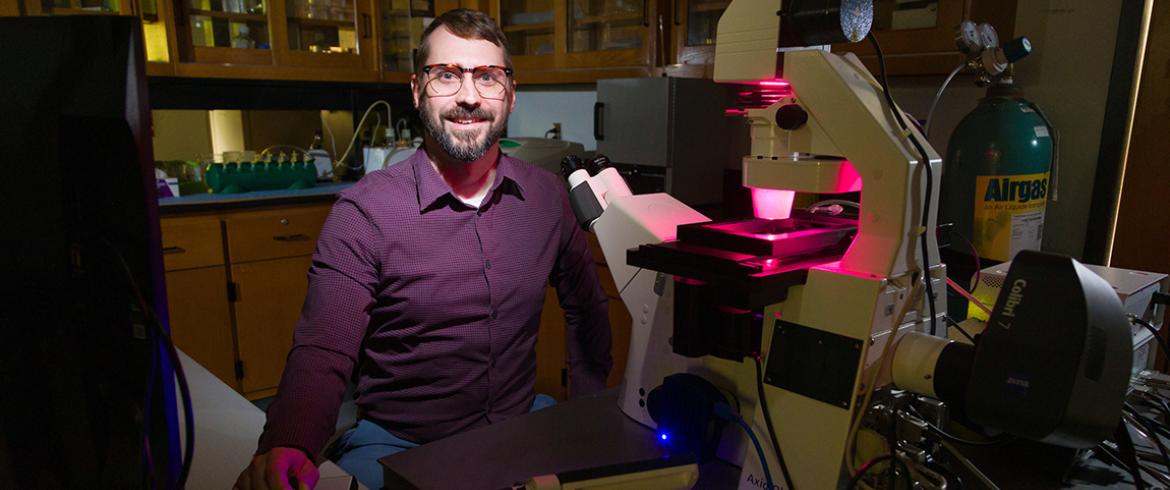
Tristan Driscoll, Assistant Professor of Chemical & Biomedical Engineering, poses with the Zeiss Axio Observer 7 microscope in his lab at the FAMU-FSU College of Engineering in Tallahassee, Florida on August 14, 2024. The Driscoll lab’s Zeiss Axio Observer 7 is customized to allow for fast switching motorized control of 4 independent light parameters, one of which orients the polarization of the light.
Assistant Professor Tristan Driscoll, a faculty researcher in the Department of Chemical and Biomedical Engineering at the FAMU-FSU College of Engineering and Florida State University, has received a $1.8 million grant the National Institutes of Health (NIH) to unravel the complexities of how cells within the body sense and respond to directional forces.
“Fundamentally, this biological process is critical for the maintenance of organized tissue structure, which in turn ensures the proper functioning of organs,” Driscoll said. “When this intricate sensing mechanism is disrupted, it can lead to severe health issues, including fibrotic diseases, cancers, and ultimately, organ failure.”
The work promises to revolutionize our understanding of cellular mechanics and lay the groundwork for mitigating conditions like fibrosis and cancer, which involve cellular mechanical dysfunction.
The work promises to revolutionize our understanding of cellular mechanics and lay the groundwork for mitigating conditions like fibrosis and cancer, which involve cellular mechanical dysfunction.
Traditionally, the methods used in cell mechanics research have been limited, focusing only on a few biophysical parameters at a time. This has hampered a comprehensive understanding of cellular responses to all the different mechanical cues, Driscoll explained.
“We want to fill in the gap by analyzing the complex interplay of forces, dynamics, orientations, and molecular interactions within cells,” Driscoll said. “This will lay the foundation for novel medical interventions.”
Driscoll works with a collaborative network of partners in various health specialization areas, such as fibrosis, cardiovascular disease and neurodegeneration. His team uses cutting-edge microscopy and engineered biomaterials as tools. The research aims to pave the way for novel strategies to counteract tissue structure loss and foster the engineering of functional replacement organs.
“Figuring out how molecules sense direction inside living cells is tricky,” Driscoll says. “To address this, we use special microscopes and glowing tags to watch how these molecules move, orient and stretch in real-time.”
An easy way to understand this is to think of the body like a busy city, with the cells as citizens. These cells, like people in a town, need to know which way to go and what to do. They get their directions from the environment around them. This process of getting and understanding directions from the physical world is called “mechanosensing.” It’s important because it helps cells decide when to grow, move, or react when an injury or illness occurs.
The project will develop new methods to study and control how cells behave when growing, moving, or reacting to diseases.
“With fibrotic remodeling processes implicated in 45% of deaths in developed countries, the stakes could not be higher,” Driscoll said. “A comprehensive grasp of directional force sensing could enable targeted strategies to slow or reverse tissue structure loss and inspire the engineering of functional, stable replacement organs”—a ray of hope for millions affected by these conditions.
The study is funded by a five-year Maximizing Investigators’ Research Award (MIRA) from the National Institutes of General Medical Sciences, part of the National Institutes of Health (NIH).
The MIRA program is designed to provide researchers more stability and flexibility, enhancing scientific productivity and paving the way for breakthrough discoveries. The grant acknowledges Driscoll’s research potential to transform our understanding of fundamental biological processes and their implications for treating a range of diseases. This project will be supported under award number R35GM155264.
RELATED ARTICLES
Researchers Examine Role of Crucial Hormone and Exercise with $1.8M NIH Grant
Nole Engineer Alumna Tapped for Department Chair at UF
